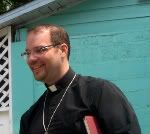a priest's musings on the journey
Tuesday, June 05, 2007
St Boniface, Apostle of Germany, Monk of the English Church

Preface for the Liturgy of St. Boniface's Day
It is truly meet and just, right and availing to salvation, that we should always and in all places give thanks to Thee, O Holy Lord, Father almighty, everlasting God, Whose grace chose blessed Boniface to the episcopate, Whose teaching made him wise in preaching, Whose power strengthened him to persevere, that by way of the priestly mitre he might reach the palm of martyrdom, both teaching his subjects by preaching, and instructing them how to live by his example, and confirming them by suffering, that he might come to Thee to be crowned, who had fearlessly overcome the threats of his persecutors. By his intercession, we beseech Thee, may he cleanse us of our misdeeds who pleased Thee with such choice manifestations of Thy gifts, through Christ our Lord. By Whom Angels praise Thy majesty, Dominions worship, the Powers tremble. The heavens, and the heavenly Virtues, and the blessed Seraphim, concelebrate in one exultation, with whom command our voices also to have entrance, we beseech Thee, humbly confessing Thee, and saying: Holy, Holy, Holy, etc.
From Old Sarum Rite Missal, (c) 1998 St. Hilarion Press, Austin, Texas
+++++++++++++++++++++++++++++++++++++++++++++++++++++++++++++++++++++++++++++++++++++
Boniface, then known as Wynfrith, was born in Crediton, Devon, in about 680AD. He went to study at the Benedictine Monastery at Nursling, near Southampton. So able and respected did he prove to be, that when the old Abbot died, Wynfrith was offered his place: but he felt called to the life of a missionary and in 716 set sail to convert the heathen tribes in Frisia (now Friesland, The Netherlands). Although his first mission was not a success, his subsequent work in Frisia and Hesse, this time backed by papal authority, gained him the reputation of being an outstanding missionary and administrator. It was at this time that the Pope gave him the name of Boniface. In 722, Pope Gregory II made him Bishop of all Germany east of the Rhine, and Boniface embarked on 30 years of missionary work in Hesse and Thuringia.
He boldly tackled superstition, including the felling of Thor's sacred Oak at Geismar by his own hand in front of hostile tribesmen, and laid the foundation of a flourishing new church. In 738, he was made Archbishop, and crowned Pepin King of all the Franks at Soissons in 751 - an act which ensured the alliance between the Frankish crown and the Papacy which was to be the foundation of Charlemagne's Holy Roman Empire 50 years later. At the age of 70, he set out again to tame the wild tribes of Frisia. On 5 June 754/5, he and his companions were surprised at dawn by a band of heathen warriors near Dokkum. Boniface was struck down by a sword which pierced the holy book he raised to shield his head. His body was taken to Fulda for burial in accordance with his wishes.

A pleasant tradition credits Boniface with the invention of the Christmas Tree.
The Oak of Thor at Geismar was chopped down by Boniface in a stage-managed confrontation with the old gods and local heathen tribes. A fir tree growing in the roots of the Oak was claimed by Boniface as a new symbol. "This humble tree's wood is used to build your homes: let Christ be at the centre of your households. Its leaves remain evergreen in the darkest days: let Christ be your constant light. Its boughs reach out to embrace and its top points to heaven: let Christ be your Comfort and Guide". The tree became a sign of Christ in the world for the German peoples, and nowadays it is a universal reminder of Christmas.
A Prayer of Saint Boniface
Eternal God, the refuge and help of all your children,
we praise you for all you have given us,
for all you have done for us,
for all that you are to us.
In our weakness, you are strength,
in our darkness, you are light,
in our sorrow, you are comfort and peace.
We cannot number your blessings,
we cannot declare your love:
For all your blessings we bless you.
May we live as in your presence,
and love the things that you love,
and serve you in our daily lives;
through Jesus Christ our Lord.
:: posted by Padre Rob+, 6:11 AM

